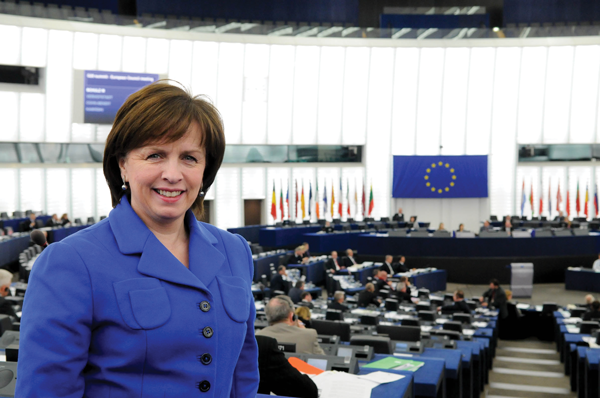Diane Dodds: time for an exit
Rising costs and interference mean the UK is better off outside the EU, according to Diane Dodds. The DUP MEP discusses Northern Ireland’s place in Europe and her priorities with Peter Cheney.
Diane Dodds is in the conflicting position of wanting the best financial deal for Northern Ireland in Europe and also wanting the UK to quit the EU, therefore cutting off those funds. However, she sees no such contradiction when the point is put to her.
As part of a net contributor, Northern Ireland must “get more back out of Europe than it currently does” and leaving the EU would ultimately mean getting back “all the millions and billions that we actually pay in.”
The UK’s net contribution was £9.2 billion in 2010-2011. Dodds recognises that Northern Ireland has benefitted from Europe, especially through CAP and the Peace funding, but her basic principle is sovereignty. “I don’t want people from 26 other different countries in Europe deciding what I can or cannot do with my money,” she states.
Food focus
Making the most of Common Agricultural Policy (CAP) and Common Fisheries Policy reforms is Dodds’ main priority at present. Both policies directly affect lives in Northern Ireland and she sits on the relevant European Parliament committees.
£268 million has been paid out to date from DARD’s 2010 single farm payment budget.
Two battles stand out in CAP: the ongoing European talks and challenging the UK Government, which wants to move money from farmers’ support to environmental schemes. In Dodds’ view, CAP should be “a food policy not an environment policy” and she claims that many Conservative and Unionist pronouncements would not “sit easy” with farmers in Northern Ireland.
The phrase Conservative and Unionist, of course, harks back to the UCUNF pact. Jim Nicholson was the only successful candidate. The DUP is keen to connect the UUP with unpopular government policies. Later, Dodds pledges to hold the Conservatives and Unionists responsible if the UK Government fails to hold a referendum on treaty changes. And ultimately, she wants a referendum on the UK’s membership; the DUP has consistently called for the UK’s withdrawal.
Dodds predicts a growing demand for a poll: “No matter what Cameron said at the [Conservative Party] conference, the Government will be edged towards allowing people a free choice and because we are net contributors, because this place costs every citizen in the United Kingdom, then I believe that we need to have a say in where we’re going.”
The Daily Telegraph calculates that in 2010 each household made a net contribution of £299 towards EU funds. Her husband Nigel helped to present a 100,000-signature petition to Downing Street, separate from the e-petition which triggered the House of Commons vote.
“No country can live unto itself. We need to be able to trade with our European partners,” she explains. “What we don’t want is the federalism and the invasion and the intrusion into the minutiae of national life that these institutions represent.”
Calling referendums runs against the British parliamentary tradition, but she says that argument has “long since passed the post” as UK voters approved EU membership i.e. the 1975 referendum.
All EU institutions are “convulsed” by the debt crisis and the need to set priorities for the 2014-2020 budgeting cycle. Given the waste and bureaucracy in the EU, she supports a cut in the overall budget (currently projected at €1.03 trillion) and says that a smaller version could still fund CAP, the structural funds and the Cohesion Fund.
Foreign affairs
The European External Action Service is, to Dodds, a key example of waste. Launched last December, this is the EU’s new diplomatic arm but its Commissioner, Baroness Ashton, has been “given an impossible job, to try to form a coherent foreign policy for 27 nations”.
Ashton, for example, was unable to give a coherent response when MEPs debated Palestinian statehood in September. “Foreign policy is the prerogative of member states,” Dodds maintains. The service’s 2011 budget is €464 million.
Israel is a “long-held interest” of Dodds. She has no objection to giving aid to Palestinians but finds that the European Parliament “can sometimes be a lonely place for those who speak out in support of Israel.” Two EU-Israel trade agreements, on industrial and pharmaceutical products, were signed and approved by the Council of Ministers in May 2010 but have been held up in the Parliament. The delay, she explains, is holding back cutting edge research and potential medical treatments.
The MEP says that the “pejorative language” of occupied territories should be avoided, even though the term is broadly recognised: “If we go into a situation with pre-conceived views to tell people how to do things then we will never be able to work with those people.”
Instead, she focuses on building blocks for peace e.g. the inclusion of Arab-Israeli women in the workplace. Asked whether she is uncomfortable with the loss of British personnel in the Israeli War of Independence, Dodds responds: “We cannot keep going back and back. As a democratic politician, I want to see democracy flourish. Israel is a democracy in every modern sense of the word.” She adds: “I am a friend of Israel but not an uncritical friend of Israel.”
She rejects the idea of abstaining from the Parliament as her manifesto commits her to going to Brussels. Back home, her office has drawn up a funding guide for community groups and non-profit organisations. Her overall ambition is to end British EU membership. Norway, she stresses, enjoys free trade agreements outside the EU before lamenting on “the disadvantages of the working time directives, the social and employment legislation, and all of the red tape and hassle and money that this place involves.” To put it another way, Diane Dodds hopes the day will come when MEPs are no longer needed.






